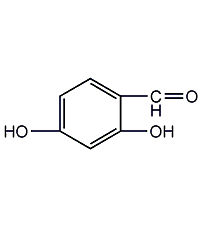2,4-Dihydroxybenzaldehyde

Structural formula
| Business number | 028J |
|---|---|
| Molecular formula | C7H6O3 |
| Molecular weight | 138.12 |
| label |
2,4-Dihydroxybenzaldehyde, 2,4-Dihydroxy benzaldehyde, 2,4-dihydroxy-Benzaldehyde, β-Resorcylaldehyde, (HO)2C6H3CHO |
Numbering system
CAS number:95-01-2
MDL number:MFCD00011686
EINECS number:202-383-1
RTECS number:VH3600000
BRN number:878548
PubChem number:24863366
Physical property data
1. Properties: off-white to brown powder.
2. Density (g/mL, 20℃): Undetermined
3. Relative vapor density (g/mL, air=1): Undetermined
4. Melting point (ºC): 133-138
5. Boiling point (ºC, normal pressure): Undetermined
6. Boiling point (ºC, 0.67KPa): 220- 228
7. Refractive index: Undetermined
8. Flash point (ºC): Undetermined
9. Specific rotation (º): Undetermined
10. Autoignition point or ignition temperature (ºC): Undetermined
11. Vapor pressure (mmHg, ºC): Undetermined
12. Saturation Vapor pressure (kPa, ºC): Undetermined
13. Heat of combustion (KJ/mol): Undetermined
14. Critical temperature (ºC): Undetermined
15. Critical pressure (KPa): Undetermined
16. Log value of oil-water (octanol/water) partition coefficient: Undetermined
17. Explosion upper limit (% , V/V): Undetermined
18. Lower explosion limit (%, V/V): Undetermined
19. Solubility: Easily soluble in ethanol, ether, chloroform and Glacial acetic acid, slightly soluble in cold benzene.
Toxicological data
1. Acute toxicity: rat oral LD50: 400mg/kg; mouse oral LD50: 1380mg/kg; mouse abdominal LD50: 200mg/kg;
Ecological data
Slightly harmful to water.
Molecular structure data
1. Molar refractive index: 36.76
2. Molar volume (cm3/mol): 97.9
3. Isotonic specific volume (90.2K ): 282.3
4. Surface tension (dyne/cm): 69.0
5. Polarizability (10-24cm3): 14.57
Compute chemical data
1. Hydrophobic parameter calculation reference value (XlogP): 1.5
2. Number of hydrogen bond donors: 2
3. Number of hydrogen bond acceptors: 3
4. Number of rotatable chemical bonds: 1
5. Number of tautomers: 12
6. Extension�Molecular polar surface area (TPSA): 57.5
7, Number of heavy atoms: 10
8, Surface charge: 0
9, Complexity: 124
10. Number of isotope atoms: 0
11. Number of determined atomic stereocenters: 0
12. Number of uncertain atomic stereocenters: 0
13. The number of determined stereocenters of chemical bonds: 0
14. The number of uncertain stereocenters of chemical bonds: 0
15. The number of covalent bond units: 1
Properties and stability
Sensitive to air. It easily turns into brown amorphous powder in humid air. Easily decomposed by acids and alkalis. Avoid contact with air and oxides.
Storage method
Stored sealed in a cool, dry place. Make sure the workspace has good ventilation. Keep sealed. Keep away from sources of fire and store away from oxidizing agents.
Synthesis method
None
Purpose
Used in organic synthesis.
extended-reading:https://www.newtopchem.com/archives/44229extended-reading:https://www.newtopchem.com/archives/696extended-reading:https://www.newtopchem.com/archives/1682extended-reading:https://www.bdmaee.net/wp-content/uploads/2022/08/115-7.jpgextended-reading:https://www.bdmaee.net/dibutyl-tidichloride/extended-reading:https://www.bdmaee.net/syl-off-2700-catalyst-cas112027-78-0-dow/extended-reading:https://www.bdmaee.net/wp-content/uploads/2022/08/33-3.jpgextended-reading:https://www.cyclohexylamine.net/dimethyltin-oxide-cas-2273-45-2/extended-reading:https://www.bdmaee.net/wp-content/uploads/2022/08/Pentamethyldiethylenetriamine-CAS-3030-47-5-PC5.pdfextended-reading:https://www.bdmaee.net/niax-ef-600-low-odor-balanced-tertiary-amine-catalyst-momentive/

